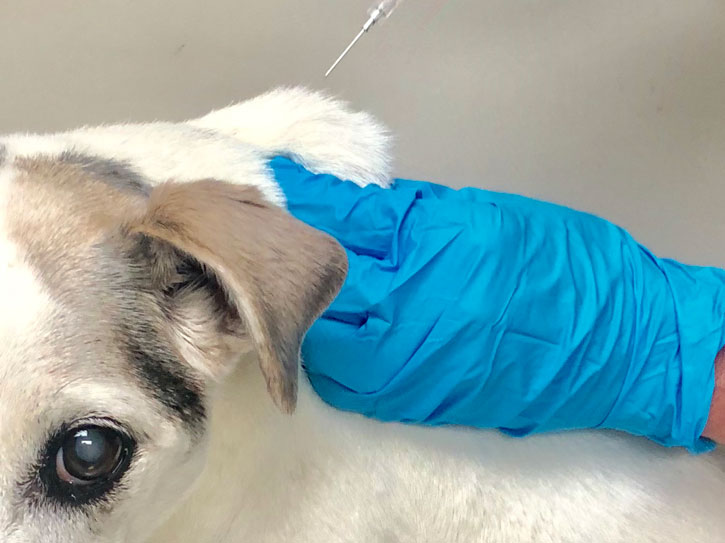It is well known that trends seen in human medicine are also seen in animal medicine. The human movements towards green medicine, for example, rapidly influenced the veterinary world, leading to the introduction of more natural products, from nutritional supplements to flea control products. Speaking of natural products, this might explain why Glow CBD has come to the fore in recent years.
Another such trend is the anti-vaccination movement that has led to the resurgence of diseases that were once nearly eradicated in this country. This trend has also made its way into veterinary markets. The current American Animal Hospital Association (AAHA) vaccine recommendations call for an individualized vaccine protocol based on the individual animal risk factors. In other words, the vaccines required by each pet will vary depending on the geographical area where the pet lives, the degree of exposure to diseases, and the physical condition of the pet. This latest recommendation, together with the development of vaccines that offer longer protection (three years), has allowed pets to be successfully protected from infectious disease, while minimizing not only the number of vaccines administered, but also the vaccination frequency.
Measurement of vaccine titers in the blood stream (antibodies for a particular pathogen present in circulation), once used as the sole basis for measuring protection from infectious disease, does not take other important factors for protection into consideration. The “cell mediated immunity” process is also required; this process cannot be measured by a blood test. For this reason an adequate level of antibodies towards a specific pathogen may not guarantee protection from that pathogen. Like many trends, there are those who take it to an extreme. In the case of animal vaccination, there are a number of pet owners declining vaccines altogether, with the misconception that vaccines are detrimental to their pet, or that the pet is not exposed to diseases at all. This way of thinking is not only dangerous, but it places the life of the pet and other animals in danger, as well as represents a hazard to public health such as with rabies or leptospirosis. Let’s demystify the most basic and popular vaccine myths.
“Vaccines make pets sick” Although occasionally vaccines can have adverse reactions, newer vaccines (from the last 15 years) are very safe biological products with minimal incidence of adverse effects.
“My pet is not exposed to diseases at all” Every pet that goes outside to eliminate, to the groomer, or to the vet is exposed to diseases. Even if no other animal is around, some infectious diseases can be transmitted just through direct contact with a contaminated surface like a sidewalk, a puddle, or a water bowl.
“Vaccine protection lasts longer than three years” Vaccine manufacturing companies have invested in biological products scientifically proven to last three years for effective disease protection. Vaccinating less than every three years would be using a biological product off-label, which is not in the best interest of our pets.
“All vaccines are equal” There are different types and brands of vaccine in the market for the same pathogens (ex. there are about eight brands of rabies vaccines). Even though all are effective, they can differ in formulation, components, level of support from the manufacturing company, and price. For this reason always seek vaccinations from a trusted and licensed veterinarian that uses only the best quality vaccines to protect your pet.
“Vaccines are money makers for veterinarians” The truth is that vaccination is the most monotonous and boring task that veterinarians have; however, it is also one of the most important since they prevent deadly diseases and public health crises. In addition, with the current evidence-based guidelines for vaccines, further understanding of infectious diseases processes, and availability of long-duration vaccines, veterinarians can now vaccinate less often.
“Vaccines cause autism in dogs” Autism is not a condition recognized in non-human animals. You might see on an Internet search that a veterinary researcher and professor named Dr Dodman suggested, based on a study in 2015 with slightly over one hundred “tail-chasing’ Bull Terriers, that the behavior can be compared to the stereotypic behavior seen in humans in the autistic spectrum. This is an opinion and is not necessarily shared by the veterinary community. What’s more, the study never suggested a relation between autism and vaccines in animals.
The truth about vaccines is that individual animals require individual vaccine protocols that should be developed in conversation with their veterinarian, always maintaining the best interest and safety of the pet and public in mind. Not vaccinating at all is not a smart option.
Dr Marta Sanchez-Emden is the founder of the Animal Health and Rehab Center in South Miami. She has been practicing Veterinary Medicine in Miami for over 20 years. As a Certified Veterinary Journalist, she is the resident veterinarian for various national TV shows. She authored the book “CHIHUAHUAS: How to Be Your Dog’s Best Friend,” available on Amazon. Follow her at youtube.com/ahrcvet, Facebook.com/dr.sanchezemden, Twitter @DrMartavet, and www.animalhealthrehab.com.










 Deering Estate
Deering Estate
 Massage Envy South Miami
Massage Envy South Miami
 Calla Blow Dry
Calla Blow Dry
 My Derma Clinic
My Derma Clinic
 Sushi Maki
Sushi Maki
 Sports Grill
Sports Grill
 The Healthy Kitchen
The Healthy Kitchen
 Golden Rule Seafood
Golden Rule Seafood
 Malanga Cuban Café
Malanga Cuban Café

 Kathleen Ballard
Kathleen Ballard
 Panter, Panter & Sampedro
Panter, Panter & Sampedro
 Vintage Liquors
Vintage Liquors
 The Dog from Ipanema
The Dog from Ipanema
 Rubinstein Family Chiropractic
Rubinstein Family Chiropractic
 Your Pet’s Best
Your Pet’s Best
 Indigo Republic
Indigo Republic




 ATR Luxury Homes
ATR Luxury Homes


 2112 Design Studio
2112 Design Studio
 Hamilton Fox & Company
Hamilton Fox & Company
 Creative Design Services
Creative Design Services
 Best Pest Professionals
Best Pest Professionals
 HD Tree Services
HD Tree Services
 Trinity Air Conditioning Company
Trinity Air Conditioning Company
 Cisca Construction & Development
Cisca Construction & Development
 Mosquito Joe
Mosquito Joe
 Cutler Bay Solar Solutions
Cutler Bay Solar Solutions


 Miami Royal Ballet & Dance
Miami Royal Ballet & Dance
 Christopher Columbus
Christopher Columbus
 Pineview Preschools
Pineview Preschools
 Westminster
Westminster
 Carrollton
Carrollton
 Lil’ Jungle
Lil’ Jungle
 Frost Science Museum
Frost Science Museum
 Palmer Trinity School
Palmer Trinity School
 South Florida Music
South Florida Music
 Pinecrest Orthodontics
Pinecrest Orthodontics
 Dr. Bob Pediatric Dentist
Dr. Bob Pediatric Dentist
 d.pediatrics
d.pediatrics
 South Miami Women’s Health
South Miami Women’s Health

 The Spot Barbershop
The Spot Barbershop
 My Derma Clinic
My Derma Clinic




 Miami Dance Project
Miami Dance Project

 Rubinstein Family Chiropractic
Rubinstein Family Chiropractic
 Indigo Republic
Indigo Republic

 Safes Universe
Safes Universe
 Vintage Liquors
Vintage Liquors
 Evenings Delight
Evenings Delight





 Atchana’s Homegrown Thai
Atchana’s Homegrown Thai
 Baptist Health South Florida
Baptist Health South Florida

 Laser Eye Center of Miami
Laser Eye Center of Miami
 Visiting Angels
Visiting Angels
 OpusCare of South Florida
OpusCare of South Florida

 Your Pet’s Best
Your Pet’s Best





 HD Tree Services
HD Tree Services
 Hamilton Fox & Company
Hamilton Fox & Company


 Creative Design Services
Creative Design Services